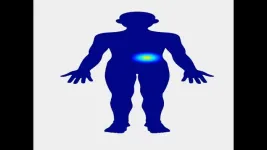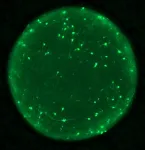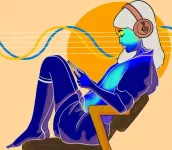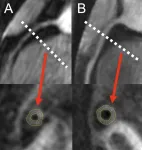(Press-News.org) Music holds an important place in human culture, and we’ve all felt the swell of emotion that music can inspire unlike almost anything else. But what is it exactly about music that can bring on such intense sensations in our minds and bodies? A new study reported in the journal iScience on April 4 has insight from studies that systematically examine the way perception of unique musical chords elicits specific bodily sensations and emotions.
“This study reveals the intricate interplay between musical uncertainty, prediction error, and temporal dynamics in eliciting distinct bodily sensations and emotions,” says Tatsuya Daikoku of The University of Tokyo. “More specifically, we found that prediction and uncertainty affect heart and abdominal sensations.”
In the study, the researchers asked 527 participants to map where they felt sensations in their bodies and the emotions they had while listening to musical chord progressions that varied in their predictability. They wanted to better understand how chord progressions are embodied and how they give rise to emotional experience. They especially wanted to learn what types of musical chords generate sensations in the heart and stomach and the emotions that go with them.
The authors suspected that uncertainty and surprise in music might play an important role. To find out, they generated 92 unique chord progressions, with varying degrees of uncertainty and surprise. Participants heard 8 chord types in random order and were asked to respond within 10 seconds with clicks to positions on a body onscreen where they felt the chords. They also were asked about how the chords made them feel emotionally.
The data showed that certain chord progressions sparked sensations in the heart while others were felt more in the stomach. Those sensations in the body also were associated with a person’s aesthetic appreciation and positive feelings about the chords they’d just heard. The evidence also supported a link between uncertainty and surprise as important elements in eliciting those bodily sensations and emotional responses.
The study also found that different types of chord progressions elicited distinct emotions. For instance, certain chords evoked aesthetic appreciation, leading to a decline in negative emotions of awkwardness and anxiety. More predictable chord progressions brought on feelings of calmness, relief, satisfaction, nostalgia, and empathy, they report.
Based on their findings, the researchers propose that the emotions and sensations inspired by music are linked to musical interoception, meaning all the senses coming from your body. They further suggest that this experience is linked to mental well-being. In future studies, they hope to explore how the maps of bodily sensations they’ve uncovered relate to a person’s physiological responses, such as changes in heart rate, to music.
###
This research was supported by the Japan Science and Technology Agency (JST) Moonshot Goal 9.
iScience, Daikoku et al. “Bodily Maps of Uncertainty and Surprise in Musical Chord Progression and the Underlying Emotional Response” https://cell.com/iscience/fulltext/S2589-0042(24)00719-3
iScience (@iScience_CP) is an open-access journal from Cell Press that provides a platform for original research and interdisciplinary thinking in the life, physical, and earth sciences. The primary criterion for publication in iScience is a significant contribution to a relevant field combined with robust results and underlying methodology. Visit http://www.cell.com/iscience. To receive Cell Press media alerts, contact press@cell.com.
END
Clinicians often find limited success in treating patients with traumatic brain injury, a condition long linked to contact sports and military services. A new study, published April 4 in the journal Cell Stem Cell, may offer new clues to better solutions. Scientists found a protein, TDP-43, that appears to drive nerve damage right after injury. Moreover, blocking a certain cell surface protein can correct faulty TDP-43 and curb nerve death in mouse and human cells.
“There’s really nothing out there that can prevent the injury ...
Lack of respectful maternity care in the U.S. culminating in mistreatment in childbirth is a regular occurrence, according to a new study at Columbia University Mailman School of Public Health. Yet until now experiences of this mistreatment had not been widely documented in the United States. The findings are published in JAMA Network Open.
To estimate the prevalence of mistreatment by care providers in childbirth, the researchers collected survey data from a representative sample of people who had a live birth in 2020 ...
An astrophysicist from The University of Texas at Dallas and his colleagues from the Dark Energy Spectroscopic Instrument (DESI) collaboration are at the forefront of an ambitious experiment to study the expansion of the universe and its acceleration.
Dr. Mustapha Ishak-Boushaki, professor of physics in the School of Natural Sciences and Mathematics (NSM) at UT Dallas, is a member of the DESI collaboration, an international group of more than 900 researchers from over 70 institutions around the world engaged in a multiyear experiment to increase understanding of the ...
Music which surprises us can be felt in the heart, while music which matches our expectations can bring feelings of calmness and satisfaction, according to a new study. Researchers played eight short tunes made up of just four chords each to over 500 participants. Each tune had a varied mix of surprising and unsurprising, and certain and uncertain chord progressions. When asked to report how the tunes made them feel and where they were affected, participants’ answers showed that fluctuations in predictions about chord sequences were felt in specific parts of the body, notably the heart and abdomen. Researchers also ...
A nerve-stimulation treatment for obstructive sleep apnea that originally was approved only for people with body mass indexes (BMIs) in the healthy range recently was extended to patients with BMIs up to 40, a weight range generally described as severely obese. A healthy BMI ranges from 18.5 to 24.9.
The expanded eligibility criteria for the treatment provide more sleep apnea patients with access to the increasingly popular therapy, known as hypoglossal nerve stimulation. However, new research from Washington University School of Medicine in St. Louis indicates that the likelihood of successful nerve-stimulation treatment ...
About The Study: Among 7,998 adults hospitalized during the 16 months before the first respiratory syncytial virus (RSV) vaccine recommendations, RSV disease was less common but similar in severity compared with COVID-19 or influenza disease among unvaccinated patients and more severe than COVID-19 or influenza disease among vaccinated patients for the most serious outcomes of invasive mechanical ventilation or death.
Authors: Diya Surie, M.D., of the Centers for Disease Control and Prevention in ...
About The Study: In this randomized crossover clinical trial with 62 participants, non-hospitalized patients with post-COVID condition (PCC) generally tolerated exercise with preserved cardiovascular function but showed lower aerobic capacity and less muscle strength than the control group. They also showed signs of postural orthostatic tachycardia and myopathy. The findings suggest cautious exercise adoption could be recommended to prevent further skeletal muscle deconditioning and health impairment in patients with PCC.
Authors: Andrea Tryfonos, Ph.D., of the Karolinska Institutet in Stockholm, is the corresponding author.
To ...
People suffering from post-COVID have been discouraged from exercising because early observations suggested it could be harmful. In a study published in JAMA Network Open, researchers from Karolinska Institutet show that post-covid does not mean that exercise must be strictly avoided.
People affected by post-COVID often experience symptoms such as extreme fatigue, shortness of breath, high resting heart rate, and muscle weakness. Symptoms are often exacerbated by exertion.
“The World Health Organization (WHO) and other major bodies have said that people with post-covid ...
Viruses need hosts. Whether it’s measles, the flu or coronavirus, viral pathogens cannot multiply or infect other organisms without the assistance of their hosts’ cellular infrastructure. However, humans are not the only ones affected by viruses: animals, plants and even microorganisms can all serve as hosts. Viruses that use bacteria as host cells are called bacteriophages (or simply “phages” for short) and are thought to be the most abundant biological entities of all. Just as the human immune system springs ...
OAK BROOK, Ill. – A new study found increased coronary vessel wall thickness that was significantly associated with impaired diastolic function in asymptomatic, middle-aged individuals living with HIV. The study was published today in Radiology: Cardiothoracic Imaging, a journal of the Radiological Society of North America (RSNA).
According to the World Health Organization, approximately 39 million people were living with HIV at the end of 2022. Since 2010, HIV-related deaths have been reduced by 51%, but HIV continues to be a major global public health issue, claiming 40.4 million lives so far.
As effective therapy drugs increase ...







